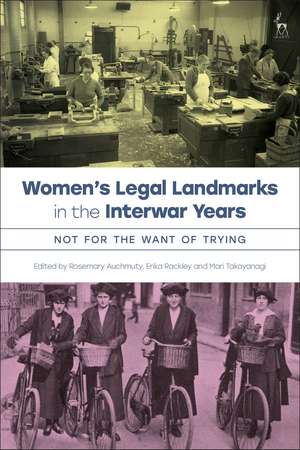Women’s Legal Landmarks in the Interwar Years: Not for the Want of Trying
Editat de Professor Rosemary Auchmuty, Erika Rackley, Mari Takayanagien Limba Engleză Hardback – 7 aug 2024
Preț: 512.30 lei
Preț vechi: 595.70 lei
-14% Nou
Puncte Express: 768
Preț estimativ în valută:
98.03€ • 102.61$ • 81.59£
98.03€ • 102.61$ • 81.59£
Carte disponibilă
Livrare economică 10-24 martie
Preluare comenzi: 021 569.72.76
Specificații
ISBN-13: 9781509969722
ISBN-10: 1509969721
Pagini: 368
Dimensiuni: 156 x 234 mm
Greutate: 0.61 kg
Editura: Bloomsbury Publishing
Colecția Hart Publishing
Locul publicării:London, United Kingdom
ISBN-10: 1509969721
Pagini: 368
Dimensiuni: 156 x 234 mm
Greutate: 0.61 kg
Editura: Bloomsbury Publishing
Colecția Hart Publishing
Locul publicării:London, United Kingdom
Caracteristici
Covers issues such as property, family relationships, access to health care, criminal law, employment opportunities, pay, pensions and political representation
Notă biografică
Rosemary Auchmuty is Professor of Law at the University of Reading, UK.Erika Rackley is Professor of Law at the University of Kent, UK.Mari Takayanagi is Senior Archivist at the Parliamentary Archives, UK.
Cuprins
1. Parliament (Qualification of Women) Act 1918, Mari Takayanagi (Parliamentary Archives, UK)2. Constance Markiewicz (1918), Aoife O'Donoghue (Queens University, Belfast, UK)3. Foundation of the International Federation of University Women (1918), Liz Goldthorpe (Ireland)4. Nancy Astor (1919), Jacqui Turner (University of Reading, UK)5. Report of the War Cabinet Committee on Women in Industry (1919), Anne Morris (University of Liverpool, UK)6. Industrial Courts Act 1919, Erika Rackley (University of Kent, UK) 7. Ivy Williams (1920), Caroline Morris (Queen Mary University of London, UK)8. Formation of the Six-Point Group (1921), Rosemary Auchmuty (University of Reading, UK)9. Lady Rhondda's Petition for Women to Sit in House of Lords (1922), Mari Takayanagi (Parliamentary Archives, UK)10. Monica Geikie Cobb (1922), Caroline Derry (The Open University, UK)11. Criminal Law Amendment Act 1922, Caroline Derry (The Open University, UK)12. Intoxicating Liquors Act 1923, Mari Takayanagi (Parliamentary Archives, UK) 13. Law Society Installs a Women's Cloakroom (1923), Eduardo Reyes (Law Society Gazette, UK)14. Agnes Twiston Hughes (1923), Carol Howells (The Open University, UK)15. Maud Crofts, Women Under English Law (1925): First Text on Women by a Woman Lawyer, Rosemary Auchmuty (University of Reading, UK)16. Guardianship of Infants Act 1925, Brenda Hale (Member of the House of Lords, UK)17. Widows', Orphans and Old Age Contributory Pension Act, 1925, Teresa Sutton (University of Sussex, UK)18. Administration of Estates Act 1925, Equalised inheritance Rights for Men and Women on Intestacy, Rosemary Auchmuty (University of Reading, UK)19. Short v Poole Corporation (1926), Harriet Samuels (University of Westminster, UK)20. Representation of the People (Equal Franchise) Act 1928: Ensured Equal Suffrage Between Men and Women by Allowing for all Women Over 21 to Vote, Regardless of Property Ownership, Mari Takayanagi (Parliamentary Archives, UK)21. Age of Marriage Act 1929, Laura Lammasniemi (University of Warwick, UK) and Kanika Sharma (SOAS, University of London, UK))22. Ministry of Health Memorandum 153/MCW (1930), Joanne Beswick (Staffordshire University, UK)23. Stella Thomas (1933), Judith Bourne (St Mary's University, Twickenham, UK)24. AP Herbert, Holy Deadlock (1934), Penny Russell (University of Sheffield, UK)25. Married Women and Joint Tortfeasors Act 1935, Penny Russell (University of Sheffield, UK)26. Virginia Woolf, Three Guineas (1938), Madeleine Davies (University of Reading, UK)27. R v Bourne (1938), Lesley Hall, (Archivist and Historian, UK)28. Inheritance (Family Provision) Act 1938, Richard Hedlund (University of Lincoln UK)29. Formation of the Married Women's Association (1938), Sharon Thompson, (Cardiff University, UK)30. Infanticide Act 1938, Kelly-Ann Couzens, (University of Warwick, UK)31. Bradford Third Equitable Benefit Building Society v Borders (1939), Rosemary Auchmuty (University of Reading, UK)
